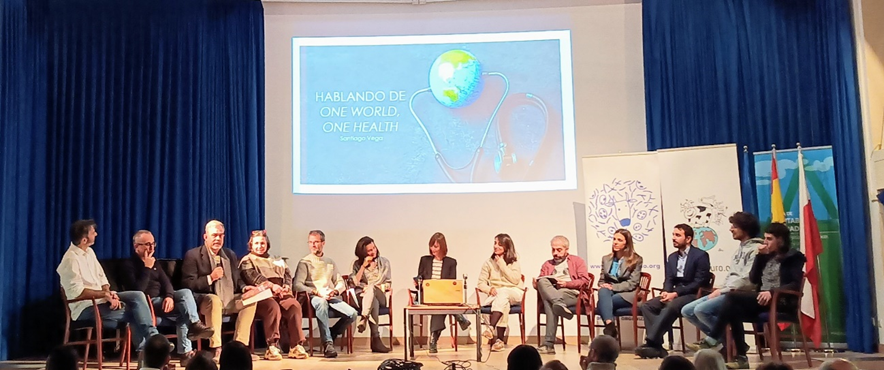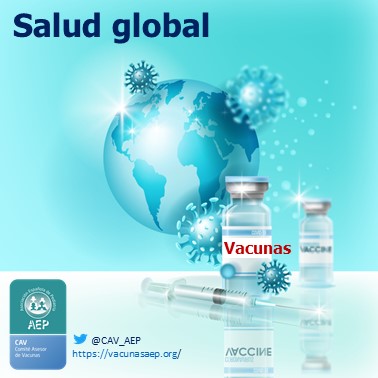| In a nutshell |
|---|
|
● La Fundación iO has been dedicated, for a decade now, to issues related to infectious diseases, emerging zoonoses, and tropical and travel medicine. ● Recently, the iO Foundation has announced the launch of a new revista, The Global Sentinelwhich aims to address these issues from a vision One Health / overall health, with a humanist vocation and a clear commitment to providing approaches from different fields. Three annual issues are planned, with a very diverse content, and with free access. ● The first issue of this magazine is already out, and this note briefly presents the main sections and contents of this first issue, its authors, and some other details. |
-oOo-
iO Foundation
On January 19, 2023, the iO Foundation presented the launch of its new body of expression: the magazine The Global Sentinel.
The iO Foundation is a scientific organization, of a foundational, independent, non-profit nature, born with a vocation for service, dedicated to the study and control of infectious diseases in the world, emerging zoonoses and tropical and travel medicine.
The Global Sentinel
 The iO Foundation He has developed projects in global health in the last 10 years. As a further step in its development, on January 19 the Foundation presented one of its most recent projects: The Global Sentinel, an informative magazine in paper format and online format. The magazine was born from the need to globally integrate the animal, human and planetary world, framed within the concept One Health (One Health or Global Health), with a humanist vocation and a clear commitment to adding voices from different fields. Three annual issues are planned, with a very diverse content.
The iO Foundation He has developed projects in global health in the last 10 years. As a further step in its development, on January 19 the Foundation presented one of its most recent projects: The Global Sentinel, an informative magazine in paper format and online format. The magazine was born from the need to globally integrate the animal, human and planetary world, framed within the concept One Health (One Health or Global Health), with a humanist vocation and a clear commitment to adding voices from different fields. Three annual issues are planned, with a very diverse content.
The launch was attended by the magazine’s editorial team, most of the authors who have participated in the preparation of the first issue, as well as those responsible for the iO Foundation. The first issue, corresponding to January 2023, includes the sections described below.

Editorial
In this section different issues related to the planet will be addressed from the field of opinion and with a perspective One Health / Salud global. In this issue, the editorial bears the title “Climate emergency means public health crisis” and has been carried out by Cristina Linares and Julio Diaz. Climate change is one of the most urgent and far-reaching environmental and social challenges facing humanity. On a global scale, it influences various sectors, reaching its maximum exponent in the area of health.
Opinion
Section in which current issues will be addressed with an in-depth analysis. Nacho Revuelta presents on this occasion: “Health exclusion makes us more stupid.” Health exclusion not only makes us a worse society, it also makes us a stupider society. Health is a collective fact and even among rich countries, those countries with the worst health coverage have worse health indicators. Health exclusion harms society as a whole and not only excluded people.
One world, one health
 A new definition for a sustainable and healthy future. In this section current issues on the strategy will be discussed global health / One Health (one health or global health).
A new definition for a sustainable and healthy future. In this section current issues on the strategy will be discussed global health / One Health (one health or global health).
In this number, Santiago Vega García introduces in his article the new definition of One Health established in December 2021 by: Food and Agriculture Organization of the United Nations (FAO), World Organization for Animal Health (WHO) and World Health Organization (WHO). “One Health is an integrated, unifying and transdisciplinary approach that aims to sustainably balance and optimize the health of people, animals and ecosystems. It recognizes that the health of humans, domestic and wild animals, plants, and the wider environment (including ecosystems) are closely linked and interdependent. This new approach engages multiple sectors, disciplines and communities at different levels of society, to work together to promote well-being, and address threats to health and ecosystems, while addressing the collective need for water, energy and clean air, safe and nutritious food, taking action on climate change and contributing to sustainable development.
Monographs
In this section treatments and global health / One Health. It will include the discovery of new and promising chemical entities, the research and development (R&D) process of new medicines and the difficulties of affordable, equitable and sustainable access to treatments, adapted to the needs of patients and communities with neglected diseases, from a perspective global health / One Health. Two monographs are included in the current issue of the magazine:
- Rosario Melero-Alcíbar analyzes the issue “Mosquitoes and climate change. Implications in the transmission of vector diseases”in which he concludes that it is essential to consider that climate change can influence the appearance of vector diseases in new latitudes, affecting populations that do not have the immunological memory to combat them and whose health systems are not prepared for their diagnosis and treatment.
- Terin Scholarship (DNDi Spain team), from the DNDi Spain team, comments on the initiative “drugs for neglected diseases”. Neglected tropical diseases (NTDs) affect millions of people worldwide, with more than 1.7 billion people requiring treatment each year for at least one NTD. Yet only a small portion of global pharmaceutical research and development is focused on developing medicines for people with these diseases, which affect the world’s poorest and most vulnerable communities.
Development
 In this issue, Inés M.ª Iglesias Rodríguez presents the results of the study “Visualizing Chagas in Japan”.
In this issue, Inés M.ª Iglesias Rodríguez presents the results of the study “Visualizing Chagas in Japan”.
Due to migratory movements, Chagas is no longer confined to Latin American territory, being a global problem. Thousands of cases are estimated in the United States (300·000 cases), Spain (55·000 cases), Italy (6,000 cases) and in fourth place Japan, with 3,000 estimated cases. However, there are few policies for the control and care of people affected worldwide. This study consisted of four phases: Phase 1. Educational-communicative activity and birth of the Chagas platform in Japan; Phase 2. Epidemiological study; Phase 3. Cost-effectiveness study of the Chagas screening program in the Japanese health system and identification of the barriers to carrying it out; and Phase 4. Foundation of the Japanese Association of People Affected by Chagas (ANACHA).
interviews
In this section It is intended to speak with different protagonists about the universe of planetary health. They will tell their vision, their concerns and their current global vision. In this first issue, Paul Strubell has interviewed the journalist Rosa M.ª Calaf, one of the most prestigious and well-known journalists in our country. She has been a correspondent in New York, Moscow, Buenos Aires, Rome, Vienna, Hong Kong and Beijing. Since 2009, she has been dedicated to teaching and dissemination and collaborates with various institutions and NGOs.
until
A section which is a journey through the different disciplines of art in the concept of global health / One Health. On this occasion, Hani Jaber Ávila and Mercedes Peña Martín present “Empathetic maps in the face of the eco-social crisis”: “When we take care of everything that surrounds us, time passes more slowly, that is when architecture builds the everyday”.
infographics
In this section Current issues will be addressed with a practical and useful approach to take care of the planet on a day-to-day basis. Cristina Juesas has analyzed “How to reduce our carbon footprint”. Considering that there are more than 7 billion people in the world consuming the planet’s resources, the time has come to reduce our impact. The article explains different strategies aimed at this objective.
The photo commented by…
 In this section a photograph chosen by the collaborator will be commented and revealed. In this case, Nacho Pena Ruiz in “Traveling slowly” he talks above all about the process that leads people to make the decision to change our habits in matters of mobility.
In this section a photograph chosen by the collaborator will be commented and revealed. In this case, Nacho Pena Ruiz in “Traveling slowly” he talks above all about the process that leads people to make the decision to change our habits in matters of mobility.
Web sentinel
Connections with social networks to see what things are happening (Cristina Juesas).
Migration
Section for the analysis of migrations, discovering the reality of a world in movement and with a global vision focused on health. In this issue of the magazine, Clara Crespillo Andújar y Nacho Pena Ruiz address “Migration and climate injustice”. It is unequivocal that human influence is warming the atmosphere, the ocean and the land. The increase in atmospheric concentrations of CO2 (in 2019 the highest on record), methane and nitrous oxide in the atmosphere during the industrial era is the direct result of human activity and the main cause of the changes we are seeing today in day in the atmosphere, the ocean, the cryosphere and the biosphere.
Innovation in Global Health
In this section news and the main technological milestones in the field of infectious diseases, tropical and travel medicine, emerging and re-emerging zoonoses will be collected from a vision global health / One Health. Manuel Linares Rufo presents “The revolution of imaging applications in infectious diseases”:
- Medical images are essential tools in diagnosis, as they allow professionals to see beyond their eyes.
- Artificial intelligence and machine learning are already here.
- Medical image processing. Machine y deep learning.
- a microscope Point of Care Testing (POC), ideal for disadvantaged environments.
vignette
Through the vignettes of Mr. Bratto we can see the world through humor, wit and above all, Art. In this issue, the cartoon is titled “Climate Change.”
 -oOo-
-oOo-
More information on this website
[volver al principio]


